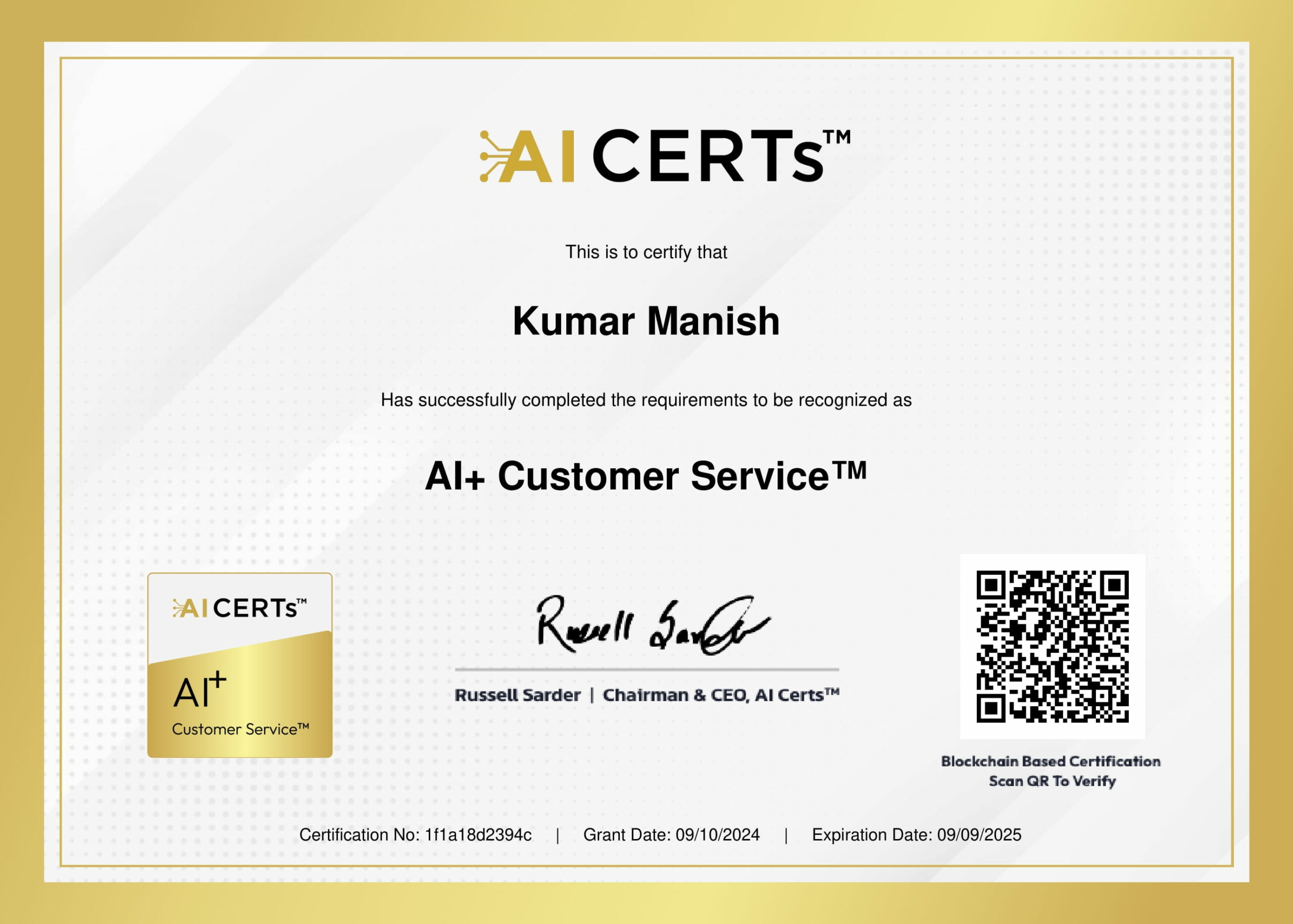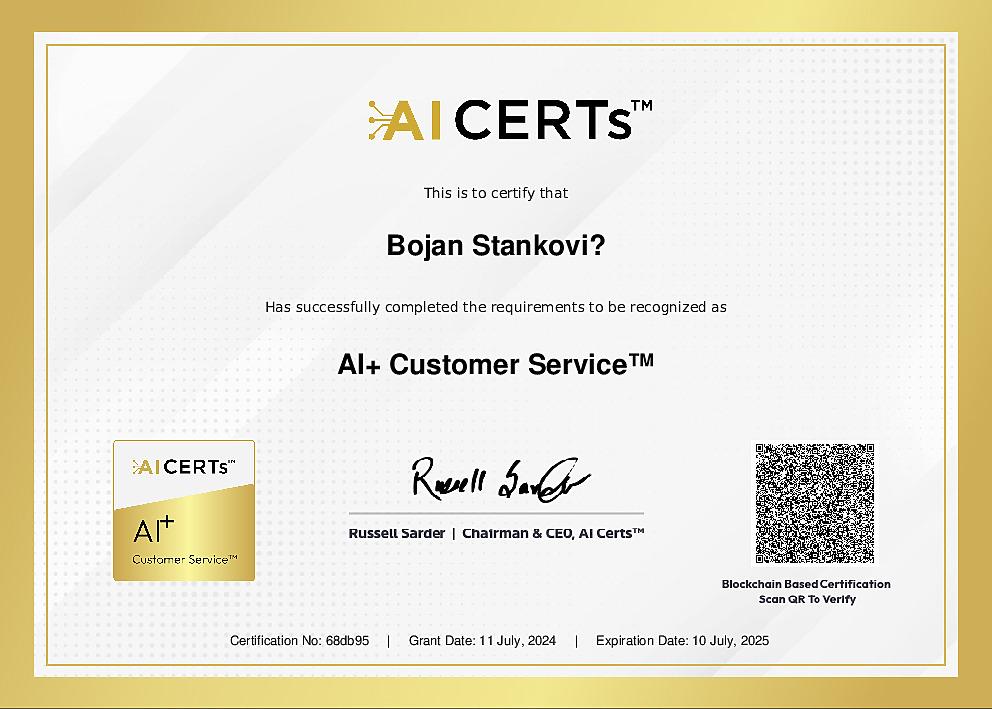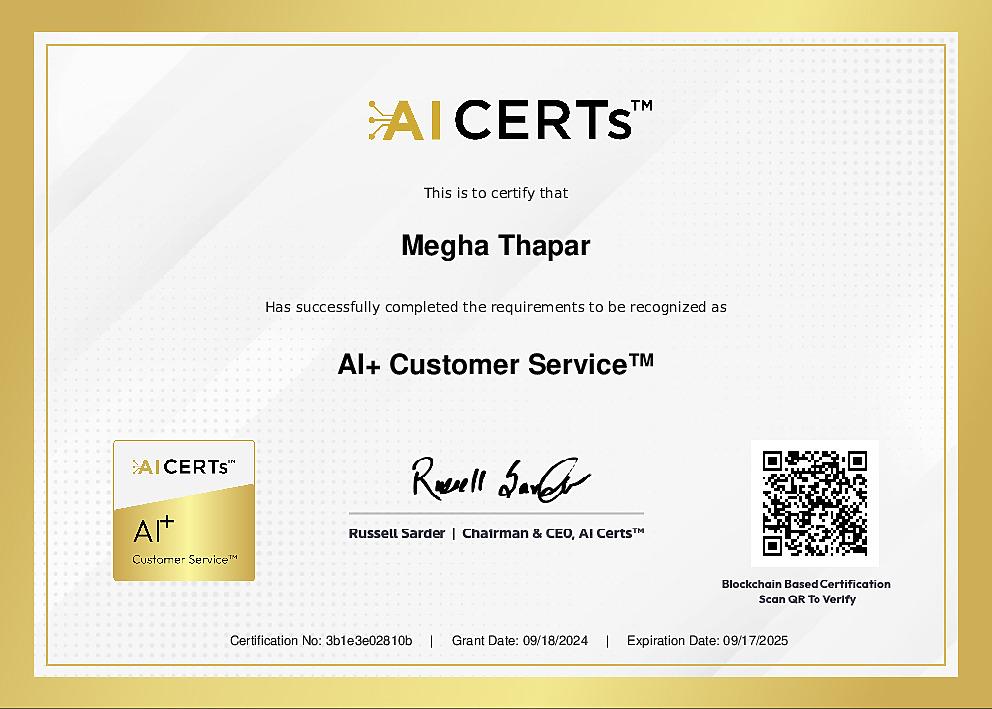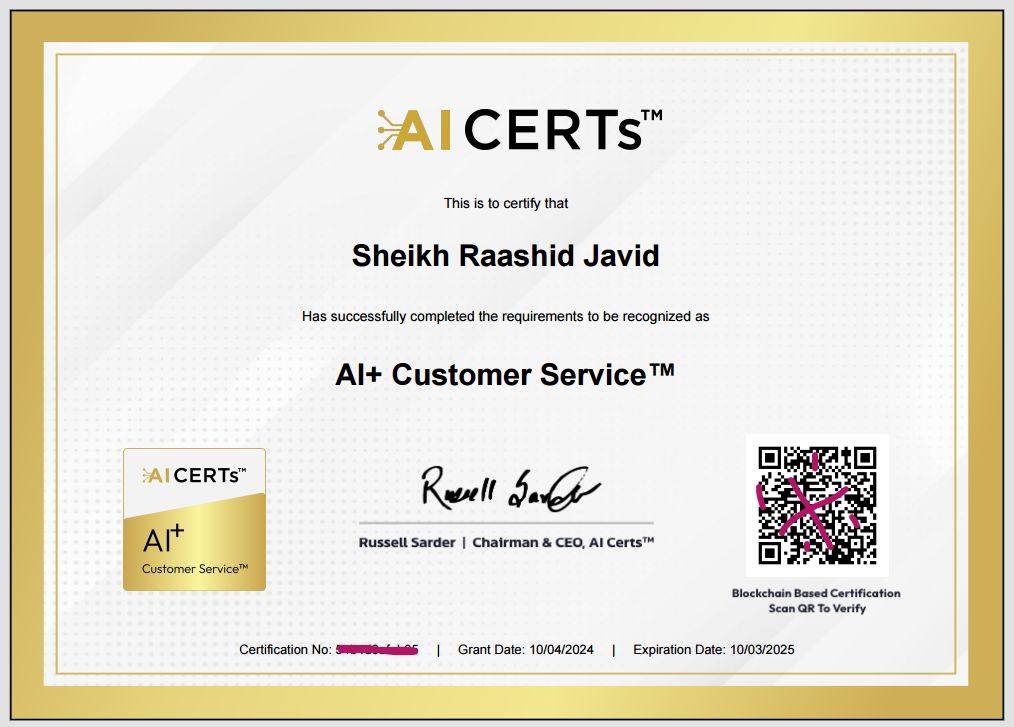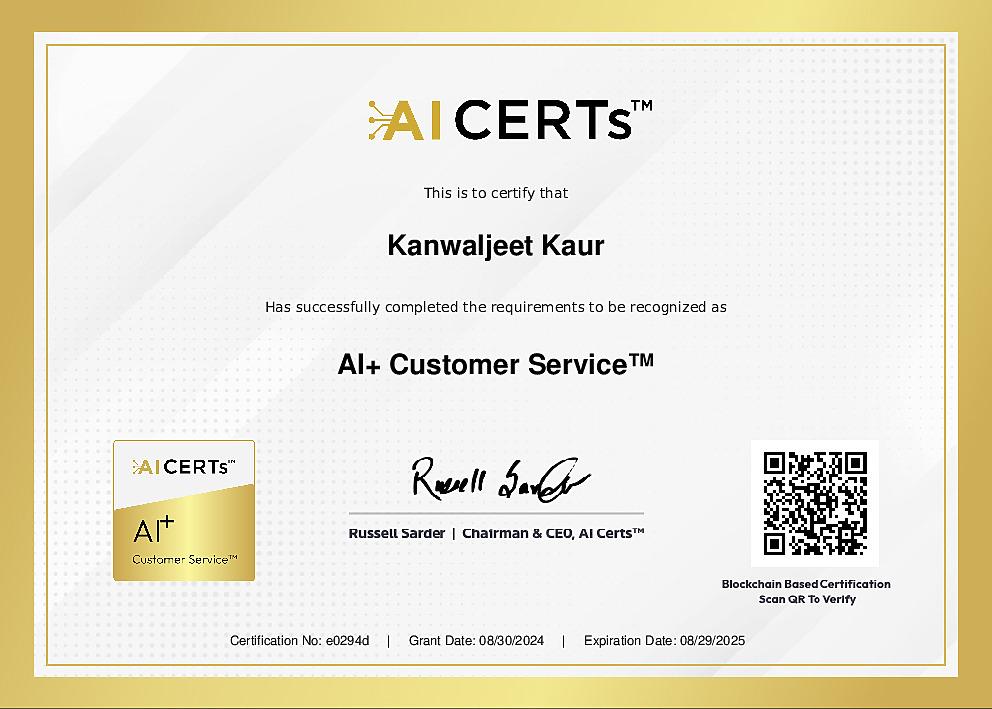AI+ Customer Service™
AP-210
Enhance Customer Experiences: Employ AI-Powered Service Solutions- Customer-Centric AI: Redefine service workflows with AI-powered personalization
- Practical Execution: Implement automation tools to optimize CX and satisfaction
- Ethical AI Integration: Covers trust-building and responsible AI practices
- Competitive Edge: Learn to enhance communication and service delivery at scale
Why AI+ Customer Service™? 10X AI-Powered Customer Experience Impact
At a Glance: Course + Exam Overview
- Instructor-Led: 1 day (live or virtual)
- Self-Paced: 8 hours of content

Who Should Enroll?
Customer Service Executives: Enhance your skills by integrating AI to optimize customer interactions and service delivery.
Technology Leaders: Leverage AI solutions to transform customer service strategies and improve operational efficiency.
Customer Experience Professionals: Apply AI-driven insights to create personalized, seamless customer journeys.
Students & Fresh Graduates: Develop future-proof skills in AI-driven customer service to stay ahead in the evolving job market.
Business Analysts: Integrate AI tools to analyze customer data and optimize service delivery strategies.
Industry Growth: Transforming Customer Experience Across Every Touchpoint
- The global AI for customer service market is estimated to reach $47.82 billion by 2030, at a CAGR of 25.8% during the forecast period. (MarketsandMarkets)
- Designing AI-driven customer engagement tools to improve response times and streamline interactions.
- Leveraging AI to analyze customer emotions and enhance service quality, leading to more personalized customer interactions.
- Optimizing customer service processes with virtual agents and AI voice bots, improving scalability and operational efficiency.
- As AI-powered customer service roles grow rapidly, there are increasing high-paying job opportunities worldwide, especially for those with AI expertise.

Skills You’ll Gain
- Data Collection and Analysis for AI
- AI Solution Implementation Strategies
- Customer Experience Optimization with AI
- Ethical Considerations in AI Deployment
- Future Trends in AI for Customer Service
- Crafting AI Strategies for Organizations
What You'll Learn
- Course Introduction
- 1.1 Overview of AI
- 1.2 Relevance of AI in Customer Service
- 2.1 Overview of Machine Learning
- 2.2 Natural Language Processing (NLP)
- 2.3 Deep Learning and Neural Networks
- 2.4 AI-Driven Analytics
- 3.1 Gathering Customer Data
- 3.2 Data Quality and Integrity
- 3.3 Analyzing Data for Insights
- 3.4 Applying Insights to Enhance Customer Service
- 4.1 AI Solutions for Customer Service
- 4.2 Integration into Customer Service Systems
- 4.3 Training and Change Management
- 4.4 Measuring the Impact of AI on Customer Service
- 5.1 Using AI to Create Personalized Customer Interactions
- 5.2 Increasing Service Efficiency with AI
- 5.3 Case Studies: Successful AI Implementations in Customer Service
- 6.1 Ethical AI Use in Customer Service
- 6.2 Building Trust through Transparency
- 6.3 Compliance with Data Privacy Regulations
- 7.1 Emerging Trends and Advancements in AI Technologies
- 7.2 Innovative Use Cases for AI in Customer Service
- 7.3 Preparing for AI Evolution in Customer Service
- 7.4 Ethical and Societal Considerations
- 8.1 Developing Strategic Plan for AI Implementation and Evolution
- 8.2 Cultivating an AI-Driven Culture
- 8.3 Overcoming Challenges and Measuring Success
- 1. What Are AI Agents
- 2. Types of AI Agents
- 3. Applications and Trends of AI Agents in Customer Service
Tools You’ll Master

Zendesk

Freddy AI

Octane AI

Rul.ai
Prerequisites
- Candidates should possess a basic understanding of business operations and the role of customer service in organizational success.
- Basic familiarity with digital tools, software, and the underlying concepts of AI is expected.
- An insight into strategic decision-making processes within organizations, especially related to technology adoption and customer service improvements.
- Genuine curiosity and openness to explore how AI can be applied to transform customer service practices and create value for businesses.
Exam Details
Duration
90 minutes
Passing Score
70% (35/50)
Format
50 multiple-choice/multiple-response questions
Delivery Method
Online via AI proctored exam platform (flexible scheduling)
Exam Blueprint
- Introduction to Artificial Intelligence (AI) in Customer Service - 12%
- Understanding AI Technologies - 12%
- Data Collection and Analysis - 12%
- Implementing AI Solutions - 20%
- Optimizing Customer Experiences - 12%
- Ethical Considerations and Trust - 12%
- Future of AI in Customer Service - 12%
- Creating an AI Strategy for Your Organization - 8%
Choose the Format That Fits Your Schedule
What’s Included (One-Year Subscription + All Updates):
- High-Quality Videos, E-book (PDF & Audio), and Podcasts
- AI Mentor for Personalized Guidance
- Quizzes, Assessments, and Course Resources
- Online Proctored Exam with One Free Retake
- Comprehensive Exam Study Guide
Instructor-Led (Live Virtual/Classroom)
- 1 day of intensive training with live demos
- Real-time Q&A and peer collaboration
- Led by AI Certified Trainers and delivered through Authorized Training Partners
Self-Paced Online
- ~8 hours of on-demand video lessons, e-book, and podcasts
- Learn anywhere, anytime, with modular quizzes to track progress
Discover Your Ideal Role-Based Certifications and Programs!
Not sure which certifications to go for? Take our quick assessment to discover the perfect role-based certifications and programs tailored just for you.
Get CertifiedFrequently Asked Questions
The course covers various AI technologies, including machine learning, Natural Language Processing (NLP), chatbots, and predictive analytics, all tailored to improve customer service.
This certification is ideal for customer service executives, technology leaders, and professionals involved in enhancing customer interactions and operational efficiency through AI-driven solutions. It caters to individuals interested in leveraging AI to optimize customer service strategies.
Yes, the course includes case studies and hands-on projects that allow participants to apply AI concepts to real-world customer service scenarios. This practical approach ensures they can implement learned strategies effectively within their organizations.
Organizations benefit by having professionals who can leverage AI to optimize customer interactions, enhance service efficiency, and build trust through responsible AI deployment. Certified individuals are adept at creating tailored AI strategies aligned with organizational goals.
Upon completion, participants are equipped with skills to revolutionize customer experiences using AI, including AI introduction, technology understanding, data utilization, ethical considerations, and strategic planning. This positions them as leaders capable of driving organizational success in the digital age.



